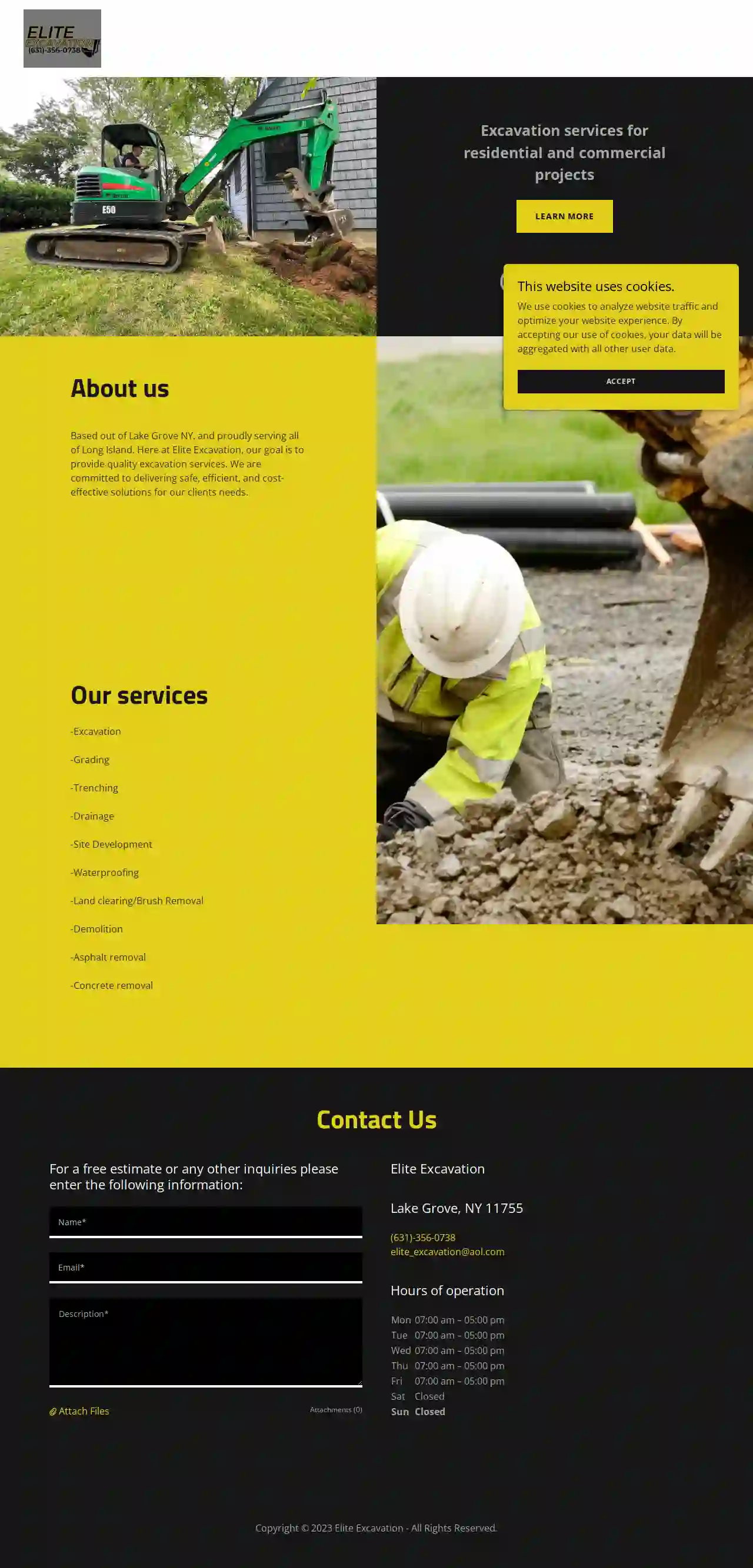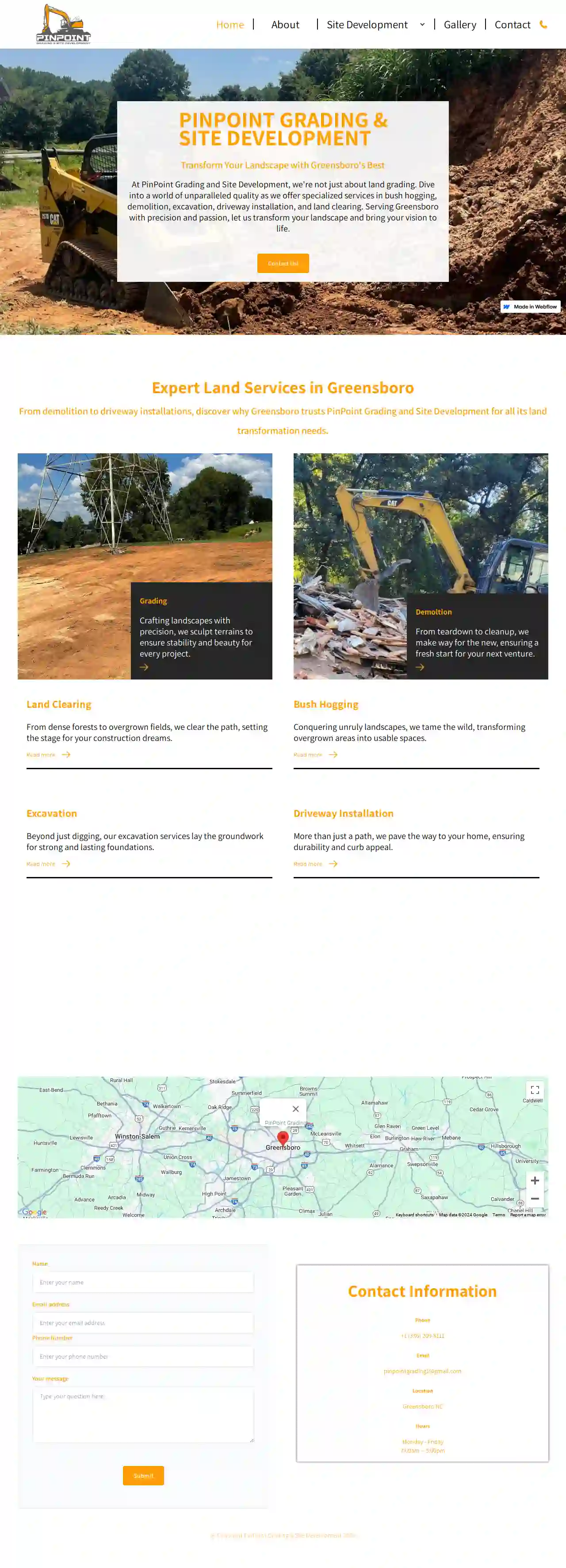Demolition Contractors Manhattan
Top 10 Building Demolition in Manhattan
Receive 3 FREE Demolition Contractor quotes for your project today! Compare profiles, reviews, accreditations, portfolio, etc... and choose the best service.

Quiver League
531 reviews381 South 5th Street, Brooklyn, NY, 11211, USAbout Quiver League Quiver League is at the forefront of revolutionizing the construction and land surveying industry. With a commitment to excellence and innovation, we specialize in monitoring the stability of adjacent structures during Demolition, Support of Excavation ( SOE), and foundation work, along with delivering comprehensive Land Surveying services. What makes Quiver Unique? Quiver League distinguishes itself within the New York City construction industry by leveraging innovative custom software systems. These cutting-edge tools empower both our field and office teams, facilitating the completion of projects at an unprecedented pace—far surpassing the capabilities of our competitors. Our distinctive software not only ensures efficiency but also prevents overwhelm, enabling us to seamlessly manage even the most demanding workloads. Moreover, it allows us to initiate new projects and field installations with remarkable agility, responding promptly to our client's needs, even on short notice.
- Services
- Why Us?
- Testimonials
- Gallery
Get Quote
Elite Excavation
51 reviewsLake Grove, NY, 11755, USAbout us Based out of Lake Grove NY, and proudly serving all of Long Island. Here at Elite Excavation, our goal is to provide quality excavation services. We are committed to delivering safe, efficient, and cost-effective solutions for our clients' needs.
- Services
- Why Us?
- Gallery
Get Quote
Apex Excavating & Construction Services, LLC
517 reviewsClay, USWelcome to Apex Excavating & Construction Services, LLC We are a team of experienced professionals committed to delivering top-quality services to our clients. Our company specializes in excavation, site preparation, and construction services in Greensboro & The Piedmont. We hold an unlimited general contractors license, so we can work on any project, no matter the size and scope. If you want to build ANYTHING, we can help. We may have started in site development, but our customers kept asking if we could build their driveway or help stand up a shed in their yard. So we added construction services to our offerings. We started small and as we grow, we strive to maintain our small company feel. By strategically partnering with skilled tradesmen in North Carolina, we maintain the flexibility of a small business, while being able to scale to meet the demands of big projects. Our mission is simple: To provide our customers with exceptional service, quality workmanship, and a smooth construction experience from start to finish. Whether you’re a homeowner, business owner, or contractor, we are committed to delivering outstanding value and exceeding your expectations in everything we do. We’re Apex Excavating & Construction Services, a family owned and locally operated construction and site development company in Greensboro, NC. We’ve been tearing up the ground and building things in the Piedmont for years, and we’re proud to be a part of the community. We’re committed to providing our customers with the highest quality services at a fair price. We’re also committed to safety, and we take every precaution to ensure that our employees and customers are safe on the job site.
- Services
- Why Us?
- Gallery
Get Quote
New Bridge Contracting Corp
52 reviews123 Newbridge Ave, Toronto, M4W 2P3, USAbout Newbridge Contracting Inc. Newbridge Contracting Inc. is a reputable and experienced general contracting company serving the Greater Toronto Area. We are dedicated to providing high-quality construction services for both residential and commercial clients. Our team of skilled professionals is committed to delivering projects on time and within budget, while maintaining the highest standards of workmanship. We understand that building or renovating your home or business is a significant investment. That's why we take a personalized approach to every project, working closely with our clients to ensure their vision is realized. From initial planning and design to final construction and completion, we are with you every step of the way. At Newbridge Contracting Inc., we pride ourselves on our commitment to customer satisfaction. We believe in building lasting relationships with our clients, based on trust, transparency, and open communication. We are confident that you will be pleased with the results of your project.
- Services
- Why Us?
Get Quote
AAL Construction Services
1123 Main Street, Anytown, 12345, USAbout AAL Construction Services AAL Construction Services is a family-owned and operated business with over 20 years of experience in the construction industry. We are committed to providing our clients with high-quality workmanship, competitive pricing, and exceptional customer service. We specialize in a wide range of construction services, including new home construction, renovations, additions, and commercial projects. Our team of experienced professionals is dedicated to exceeding your expectations and delivering projects on time and within budget. We understand that building or renovating your home is a significant investment, and we are here to guide you through every step of the process. From the initial design phase to the final walkthrough, we will work closely with you to ensure that your vision is realized. We are proud of our reputation for integrity, reliability, and customer satisfaction. We are committed to building lasting relationships with our clients and providing them with the peace of mind that comes with knowing that their project is in good hands.
- Services
- Why Us?
- Testimonials
Get Quote
CW Earthworks
52 reviews1614 Grimball Rd Ext, Charleston, 29412, USCW Earthworks, LLC We are a landscape construction company with the vision of a green future. Our mission is to operate from the position that Earth is Life. We strive to meet the needs of all customers while serving Mother Nature best in all situations. We have the ability to complete a multi-faceted project for residential and commercial clients from start to finish. About Us CW Earthworks began with the green vision of a small company equipped to complete big jobs. The Lowcountry dirt and salt is in our blood. Our team has a "generalist" mindset, and we use our broad skillset to efficiently achieve the desired vision for every job. Time in Nature defines our lives and work is also play. We value our community and we approach every situation as a new opportunity. Hire us to improve your land and take your vision to the next level! Thank You
- Services
- Why Us?
- Testimonials
- Gallery
Get Quote
Over The Edge Excavating LLC
54 reviewsP.O. Box 164, Riverdale, 07457, USOver The Edge Excavating Over The Edge Excavating is a well-established and highly regarded excavation contractor. We are known for providing top-notch services that cater to the specific needs and management requirements of our clients, all at the most competitive rates. Our team of experienced professionals is dedicated to delivering exceptional results and exceeding your expectations. Contact us today to learn how we can help you with your next project.
- Services
- Why Us?
- Accreditations
- Gallery
Get Quote
PinPoint Grading & Site Development
31 reviewsGreensboro, USAbout PinPoint Grading and Site Development PinPoint Grading and Site Development is Greensboro's premier land services provider. Rooted in the heart of North Carolina, we've built a reputation for transforming landscapes with precision and dedication. Our team, deeply connected to the Greensboro community, is committed to delivering unparalleled quality in every project, ensuring that visions turn into realities. Why Choose Us? Our team is a collective of highly-skilled professionals, each with years of specialized experience in the fields of civil engineering, landscape architecture, and land development. Their depth of knowledge ensures that your project is in the most capable hands. We don't just meet industry standards, we aim to exceed them. Our commitment to quality is unwavering, ensuring that every service we provide is executed with the utmost precision and excellence. Integrity is at the core of what we do. From the initial consultation to the final invoice, we maintain complete transparency in all our operations and pricing, so you can trust that there are no hidden fees or surprises.
- Services
- Why Us?
- Gallery
Get Quote
RND Construction
54 reviewsLocust Grove, Virginia, USServing Fredericksburg, VA & Surrounding Communities for Over 40 Years At RND Construction, we offer top tier excavation, land clearing and commercial construction services. We work diligently to meet our customer’s needs while adhering to industry standards in quality and safety. We are committed to completing our work with diligence and with extreme attention to detail. RND Construction is your top choice when it is time for your next job. Contact us today, our team is waiting to assist you! Expert & Professional Services Here at RND Construction we provide comprehensive services for homeowners and business owners across Fredericksburg, Virginia and the surrounding communities. We are experts in our field and are dedicated to providing superior workmanship and customer support. With over 40 years of professional experience, customer satisfaction is always our top priority.
- Services
- Why Us?
- Testimonials
- Gallery
Get Quote
Chris Mendenhall Excavation & Septic LLC
4.973 reviewsClay, USChris Mendenhall Excavation & Septic LLC We are a North Carolina Licensed and Insured Company. We specialize in new septic system installation or repairs to an existing septic system, new septic tanks, pump type septic tanks and systems, septic system pump replacement or repair, Residential & Commercial. Call Today for a Free Estimate. North Carolina has very specific requirements for septic system installation. Septic systems in North Carolina must be designed to fit the soil conditions of the permitted site and the surrounding area. The septic system is an effective, and long-standing method for collecting, treating, and disposing of waste water in rural and suburban homes and businesses. Septic systems are used in every county in North Carolina. Nearly 50 percent of the state’s homes have them. Septic systems are used when centralized waste water treatment plants are not accessible in a community. They safely treat and dispose of waste waters produced in the bathroom, kitchen, and laundry. These waste waters may contain disease-causing germs and pollutants that must be treated to protect human health and the environment. Septic systems are usually a permanent solution to wastewater treatment and disposal. Therefore, they must be properly used, operated, and maintained by the homeowner to safeguard their long-term performance. If you are interested in Building and new home or developing a tract of land to subdivide, you should Contact your local Health Department first to advise you on the location of suitable soils and lot configuration. If you have poor soil conditions you can hire a licensed soil scientist to conduct preliminary evaluations. You can obtain additional information from the North Carolina Cooperative Extension publication AG-439-12, Investigate Before You Invest.
- Services
- Why Us?
- Testimonials
- Gallery
Get Quote
Over 3,943+ Excavation Contractors in our network
Our excavation pros operate in Manhattan and beyond!
ExcavationHQ has curated and vetted Top Excavation Contractors near Manhattan. Find a top & trustworthy business today.
Frequently Asked Questions About Demolition Contractors
- Implosion: Using explosives to collapse a structure inwards rapidly. Suitable for large buildings in open areas.
- Wrecking Ball: Swinging a large steel ball to impact and break down the structure. Effective for bringing down walls and other solid elements.
- High-Reach Demolition: Utilizing specialized excavators with extended arms and demolition attachments for dismantling tall structures piece by piece.
- Selective Demolition: Removing specific parts of a building while preserving other sections. Often used in renovation projects.
- Deconstruction: Carefully dismantling a building to salvage reusable materials, reducing waste and environmental impact.
- Safety: Experienced contractors have the knowledge, skills, and safety training to execute demolitions safely, minimizing risks to workers and surrounding areas.
- Efficiency: Contractors have the specialized equipment and expertise to complete demolitions efficiently, saving time and reducing project costs.
- Compliance: Reputable contractors are familiar with local regulations and permitting requirements, ensuring compliance and avoiding legal issues.
- Waste Management: Contractors have waste management plans to handle debris responsibly, including recycling and proper disposal.
- Liability Protection: Insured contractors protect you from financial responsibility for accidents or damages during the demolition process.
What are the different types of demolition?
What are the benefits of hiring a professional demolition contractor?
Can I do demolition myself?
How can I tell if my building contains asbestos?
What are the different types of demolition?
- Implosion: Using explosives to collapse a structure inwards rapidly. Suitable for large buildings in open areas.
- Wrecking Ball: Swinging a large steel ball to impact and break down the structure. Effective for bringing down walls and other solid elements.
- High-Reach Demolition: Utilizing specialized excavators with extended arms and demolition attachments for dismantling tall structures piece by piece.
- Selective Demolition: Removing specific parts of a building while preserving other sections. Often used in renovation projects.
- Deconstruction: Carefully dismantling a building to salvage reusable materials, reducing waste and environmental impact.
What are the benefits of hiring a professional demolition contractor?
- Safety: Experienced contractors have the knowledge, skills, and safety training to execute demolitions safely, minimizing risks to workers and surrounding areas.
- Efficiency: Contractors have the specialized equipment and expertise to complete demolitions efficiently, saving time and reducing project costs.
- Compliance: Reputable contractors are familiar with local regulations and permitting requirements, ensuring compliance and avoiding legal issues.
- Waste Management: Contractors have waste management plans to handle debris responsibly, including recycling and proper disposal.
- Liability Protection: Insured contractors protect you from financial responsibility for accidents or damages during the demolition process.
Can I do demolition myself?
How can I tell if my building contains asbestos?
This website uses cookies for personalization and marketing purposes. To learn more please check our Privacy Policy & Cookies Policy.